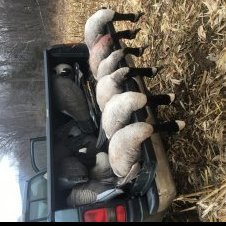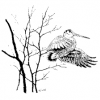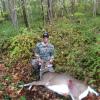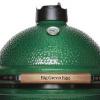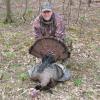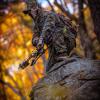Search the Community
Showing results for tags 'Waterfowl'.
-
Does anyone know of any waterfowl leases for 2018/19 season in dutchess or Columbia county ny? Or have any property they would be willing to allow two responsible hunters to hunt on? Not really looking for deer property might think of a deer/waterfowl lease depending on the property. Also interested in property for turkeys this spring.
-
Hello all, My buddy and I are midshipmen at the U.S. Merchant Marine Academy in Kings Point, Long Island. We're both avid duck hunters back home (Louisiana, Florida), but we would like to do some hunting this season up here in Long Island while we're at school. We're looking for any information on good places to hunt on the island, we don't mind driving, or anyone that's willing to allow us to tag along for a hunt. We have our licenses, guns, camo, and a few dozen decoys up here with us. Heard Suffolk County runs some public land with duck blinds, anyone have experience with that? Thanks for any information.
- 1 reply
-
- duck hunting
- waterfowl
-
(and 1 more)
Tagged with:
-
Just wanted to say thanks to all who helped make Carters Pond the waterfowl wasteland it always is after opening weekend. Not so much as a feather to be found amid the rafts of shells and wads. We do ourselves proud by busting the roost and laying waste to every wood duck we see.
-
Im selling my Browning Maxus. I bought it 3 years ago and only had it out the first season I owned it. It has only been in the field 3 times as reflected by the attached pictures. It was cleaned after every use, and is in terrific condition. It is 12 Gauge, 28" Barrel Waterfowl edition. I have the original box, all chokes and choke tool, and pieces for stock adjustment. It is easily as good as any new gun you would buy. Asking $1100. I am located in the Albany area. Email offers to [email protected] Thanks for the interest.
-
Any Snow Goose hunters on here? Looking to get into it.
- 1 reply
-
- 1
-

-
- duck hunting
- goose hunting
-
(and 1 more)
Tagged with:
-
As some of you may remember I posted on here to get your opinion on adopting a rescue dog for waterfowl hunting. As expected I got mixed advice on the matter but decided to go for it anyway. She passed her gun shyness test, got her land retrieving down after that water and boat retrieving took less than a day each. Fast forward four months from the day I adopted her and add in many hours spent training and the verdict is finally in. My girl is officially a hunter. This afternoon was the real world test and I'd say she passed with flying colors. She was a little jumpy and whiny between flights but nothing I didn't expect, it was after all her first hunt. About 30 minutes into the hunt we had a flock of 6 geese come in and give me a passing shot at about 40 yards, missed twice, had an IC in for decoying birds. Surprisingly they doubled back and came in to land and I folded one and sent the dog. I was a little worried how she'd handle a 15 lb flapping goose as her first bird but after getting wing slapped once she grabbed it and brought it back flawlessly. Couldn't be happier with her and goes to show a little commitment and work goes a long way and you don't always have to spend 1500 bucks on a pup for a hunting dog.
-
Hello - I'm in the market for a shotgun geared towards waterfowl hunting. I am new to hunting and female, so I don't want a macho gun that'll give me such kickback that I'll fly backwards upon firing or spend too much $, my budget is $500 tops and I'm guessing I need a 20 gauge. I was considering a Remington 870 (the low end model) or even a Benelli Nova. I read that for duck hunting in LI or NYS whatever, the gun can not have more than 3 rounds in it, I'm not sure how or if that impacts what kind of gun I need to get. Also what kind of action is best? Any and all model recommendations are welcomed. Thanks for your help. P.S. If anyone knows of a good gun store in Manhattan (yeah I know), or LI let me know. Aside from looking for a gun, I need to know where to buy one!
-
Was wondering if anyone on the forum hunts schoharie county and the surrounding areas? I live in Putnam but have 47 acres in middleburgh and soon hope to move up this way. the amount of geese I see flying over stand while deer hunting is sickening. That combined with my lack of downstate waterfowl spots for duck has led me to search for a few up this way. Any info would be appreciated, if anyone does duck hunt up in the region id be more than willing to tag along!
- 2 replies
-
- waterfowl
- duck hunting
-
(and 1 more)
Tagged with:
-
Good morning - I am trying to find spots, (where its legal, not legal, and feasible) to launch a kayak and hunt the north shore. I am close to Huntington, and found out that they have a no discharge firearm policy) Does anyone know areas that are legal. I am not asking for specific 'honey hole' spots.(but I'd take if anyone wants to share!), rather looking for some areas to scout, that are legal. As always, thanks for the Help. Ps - if anyone on the island has goose/duck decoys that they would like to sell, PM me. Id gladly take a look! Have a great day and Thanks, John
-
I have a one year old Chesapeake Bay I rescued a month ago to train for duck hunting. I have experience with the breed and know they can be a handful at times so I took on the project expecting just that a project. I never expected her to catch on so quickly, shes got everything down and passed her gun shyness test with flying colors. I am confident she will be in the duck blind with me this fall however, shes got one problem I am not sure how to break. She has such a high prey drive she will break and chase just about anything that moves. Last week a deer and rabbit, today the neighbors cat and it is impossible to call her off. Once she gets it in her mind shes going, shes gone. My neighbor also raises pheasants and now that she knows the scent and look of a real bird (now using a dead mallard hen for scent recognition) she immediately breaks from the house to his pheasant coop and scares the living hell out of them. I am happy shes got the drive but I can't have her bothering my neighbors. Also the non target chasing is obviously a no go while hunting. Is my best bet to have her wear an e collar and give her a zap when she wont come off and goes after non target animals. As for the neighbors pheasants I am at a loss what to do there. I don't want to discourage her bird drive. Any advice on the subject is appreciated.
- 16 replies
-
- duck hunting
- waterfowl
-
(and 2 more)
Tagged with:
-
Hey guys, throwing a last minute hail mary question out there. Being new to duck hunting I dont have the knowledge that most of you on the forum have. Anyway, I have been preoccupied with deer season and have been lucky enough to get three deer with the bow. Having all the deer meat i need i've shifted thinking towards duck hunting again. That being said i went out and scouted 4 ponds today and saw nothing in them at all. I hit a big water pond, which is about 100 acres and saw in one corner alone about 50 mallards and i couldn't even count the golden eyes and ring necks in the bunch. now my question is if you see a good bunch of ducks in the afternoon do you hunt it in the morning or wait to the afternoon to shoot. this was at about 4 in the afternoon but they were loafing around so i imagine they got there much earlier in the day and sunset and legal shooting time ends at 430. I'm gonna hit the water Saturday so any answers or input put in before that would be much appreciated.
- 2 replies
-
- duck hunting
- waterfowl
-
(and 3 more)
Tagged with:
-
We had a good hunt on Saturday. Hunted my buddy's pond with some of the New York Outdoors pro staff. https://www.youtube.com/channel/UCRAsXda_U-U48xKRW5u8ytw
-
Hi - happy to be a member here! I live out in Montauk on Long Island and grew up an avid fisherman. Over the past few years, I've really gotten the hunting bug, and have been doing all that I can to get out in the woods/blind. Joined to try and learn as much as possible! Happy hunting, Rob
- 1 reply
-
- Long Island
- Suffolk County
-
(and 2 more)
Tagged with:
-
Hey guys I would love to get another chance to hunt goose on the island. Anyone know where I can go on the western part of long island to hunt some geese? Thanks a lot guys! Preferably on shore!
-
Heading to Lake Champlain early tomorrow morning for opening day with one of the New York Outdoors pro staff members. Bringing the GoPro. The weather is not supposed to be to great but......it's the opener.....
-
Hey guys heading up to Saratoga with some new and old friends from huntingny.com! Wish us luck I will be sure to post pics and updates on some BIG DEAD HONKERS!
-
Hey Everyone I've recently been looking for a taxidermist to mount a wood duck drake iv had wrapped in the freezer for some time. The reason i have not gotten the mount done already is i don't know where to take it. I have used a taxidermist in Pennsylvania for my deer in the past but i cant justify the 4 hour drive down. Now his work is real good, but Its a long haul and his price has gone up a little to the point where what i save on the mount i make up in gas. Does anyone on here have someone who is reasonable in price and good on deer and birds not too far from the Dutchess / Putnam area. Any input would be appreciated.
- 9 replies
-
- duck hunting
- waterfowl
-
(and 1 more)
Tagged with:
-
Being that I am just starting to get back into waterfowling after a 5 year break I have been trying to reeducate myself. In my area of the state there's not many agricultural fields or private land to hunt ducks and geese. I'm pretty much restricted to a few state land areas some holding small ponds throughout. Iv seen mallards, woodies, and divers late last year in a few but never any geese. Anyone on here have suggestions on where to look for the early goose seasons any input would be appreciated.
-
Proposed additional local regulations and fees for waterfowlers on a section of Long Island? http://www.27east.com/news/article.cfm/East-End/61018/New-Rules-For-Duck-Hunters-Discussed
-
- long island waterfowl
- waterfowl
-
(and 1 more)
Tagged with:
-
February 23, 2014 We have been making the unpopular premise that it is wise to abandon the practice of uniting merely for solidarity when merit is absent, to avoid public image issues, bad policy enactment, and because it is a tool in which funnels policy decisions to a relatively select few. This is not suggesting that the decisions for 800,000 NY hunters are being made by ten people, but rather several hundred who are connected, not only to each other, but to various politicians and politically linked organizations. This is not however what this article is about and to understand that we direct you to the archives. We believe however, that we are in fact facing an issue which actually does in impact the sporting community universally. That issue is senate bill 6589 and assembly bill 8790. These bills, wish to impose a two year moratorium on the DEC’s management strategies and thereby likely require the DEC to duplicate an enormous amount of research, apparently because the conclusions of existing research do not support the political agenda of anti-hunters. One of the sponsors of the legislation, Senator Tony Avella, is endorsed by the HSUS, the largest and wealthiest anti-hunting organization in the United States. These proposals appear to have been modeled after a section of the Federal Endangered Species Act which requires an EIS or environmental impact statement in some situations. Although this federal law is sound in our opinion; the EIS as it functions in the Endangered Species Act, pertains to endangered species facing limited and/or declining range, not deleterious introduced species which are expanding their distribution, hence the term ‘invasive’. The wildlife science community at large, not just the DEC, considers mute swans to be a deleterious and invasive species based on its behavior and known impacts. The designation as an invasive species is not arrived at merely because of a species original range as is being suggested by persons opposed to the plan. As a matter of fact there are introduced species that are not necessarily invasive, however that is not the case with mute swans. This legislation also seems to be modeled after fairly recent hydrofracking moratoriums. We agree with the two consecutive moratoriums passed and imposed on hydrofracking in NY to gather more state-specific information. This moratorium proposal is much different, while ironically being very much the same… It is different because the two issues have a much different level of complexity and different levels of scientific consensus. Unlike hydrofracking, which has a history of issues in other states which have not been properly addressed, the published research about mute swans is definitive. There are two forms of research, basic and applied. Basic research is the source of knowledge regarding a specie’s biology, behavior, natural history and how it interacts with plants, animals, and people within a community. Basic research is not merely a source of the proverbial ‘fun facts’; it provides insight into a species population dynamics and how it functions in an ecological system. Applied research is problem orientated and is useful in developing management strategies like the ones outlined in the DEC’s mute swan plan. That statement needs to be qualified because it implies that basic research is never relevant to management strategies and that is not accurate. In other states the published basic research is the foundation for concern about mute swans and published applied research has been used in the development of their management strategies. The DEC’s opinion that mute swans are a harmful species in NY and the strategies within the DEC’s plan, are also guided by research published in peer-reviewed scientific journals. If one pays attention to the literature citations within the draft plan this would be apparent. We speculate the rebuttal to the above will be that state-specific or updated research is needed, but we challenge them to provide a valid reason as to why. In reality they are not interested in biological research; and will seek social research after a two year window of opportunity to make this a public opinion battle during which they can use their abundant resources to exert influence. That will effectively make this a politically-based policy instead of a science-based policy. The goals behind the strategies which comprise the DEC’s plan are to prevent the loss of breeding sites by native birds, protect submerged aquatic vegetation (SAV) from over grazing, and remove one more source of water contamination. One of the strategies to achieve those goals is hunting. The plan is being mischaracterized by some of its detractors who claim it is motivated by a desire to expand hunting opportunities; however hunting is only one of the strategies within the plan. Before we continue: we are NOT criticizing environmentalism and we are NOT categorizing people who are opposed to invasive species eradication as environmentalists. We consider ourselves environmentalists. A four year moratorium was initially issued on Hydrofracking. When that expired few people knew what fracking was. Over those four years however, legitimate concerns developed because of a history of events in other states which do allow fracking. Environmentalists organized a campaign against fracking. The first moratorium expired and the industry was anxious to get started. They thought they were going to waltz right in and start making money. They even kept themselves busy over those four years engaging landowners and even entering contracts with them to start drilling away once the moratorium expired. They knew they had a Pro-fracking President and a Pro-fracking governor – yes Obama and Cuomo, the two best friends the industry could ever have. The majority of state representatives also supported fracking, many of them endorsed and/or financed by the industry. But anti frackers were now organized and had history, as well as science on their side. Articles, editorials, and letters to the editor in local newspapers, social media sites such as face book allowed them to recruit new members at an exponential rate. The anti-fracking movement became a force against politicians and big energy. Anti-hunters are well versed in the use articles, editorials, and letters to the editor in local newspapers, and social media sites such as face book, which enable them to influence public opinion and recruit new members at an exponential rate. The HSUS is extremely well funded and it is very common for them to air infomercials on television laden with snappy, attractive propaganda to efficiently reach masses of people. So what is going to happen if the HSUS and their local affiliates in NY State succeed in passing this moratorium on swan eradication? For one thing in two years without intervention the mute swan population will grow 26 percent and their distribution throughout the state will expand as well – remember, conservation issues are time-sensitive…. Can any new research be completed in two years? No, not really… Will any additional research develop any alternative conclusions or strategies? We can’t see how that is possible with legitimate science. Will further research discover the mute swan is an integral part of the ecological processes in the state? No, it will not. However, we are aware of one study which suggested mute swans enable the native waterfowl to access food, but have not reviewed the study. It sounds like pseudo-science, but we will report on this in the future. However, even if this is true, mute swans impact native waterfowl in many ways and native birds do not depend on a symbiotic relationship with mute swans during any part of their life cycle. In other words, native birds feed themselves just fine without mute swans and have been doing for eons before the swans were introduced to this continent; the only significant impacts mute swans have on native waterfowl are negative ones. What a two year moratorium will do, however, besides allow the population size and distribution of mute swans to increase, along with the associated impacts; is it will provide anti-hunters over two years to grandstand on this issue, organize, recruit new members, and influence politicians and public opinion. Since an overwhelming amount of research, as well as common sense, support mute swan eradication, it is doubtful anti-hunters will be able to ultimately block this. However, they will have increased their following and thereby their ability to influence public opinion, politicians and thereby conservation policy by essentially blocking any science-based decisions which are not consistent with their ideologies.
- 2 replies
-
- mute swans
- dove season
- (and 8 more)
-
The word of the week is mute swans. The DEC’s draft mute swan management plan open public comment period is coming to an end on February 21, 2014. We have made an exception for the mute swan issue and diverted from our single-issue mission on our face book page. Within the timeline/wall and the events section there is background information, links to the DEC’s plan, and talking points for your use to construct written public comment to mail or e mail into the DEC. We also emphasize that mute swan eradication is an important issue on its own face; however, our response to this issue is a surrogate of sorts for future response to a mourning dove management plan and/or a mourning dove bill. Not only does it test how effectively we can mobilize people, but gauges our level of resistance against anti - dove hunters because the opposition to mute swan management is the same crowd opposed to mourning dove hunting. Furthermore this opposition uses very similar propaganda strategies in its effort to hinder management and/or use of both species. As a matter of fact, yesterday a far reaching article by animal rights activists surfaced about the DEC’s draft plan. The animal rights article focused on the mute swan being the symbol of romance, much the same as they did with a nationwide propaganda campaign spanning 50 years claiming the mourning dove, a bird indigenous to north and South America is the dove of peace. The real dove of peace, the dove referenced in religious readings, is the ringed turtle dove which occurs in the Middle Eastern region, not the Americas. We also reviewed what is going on with the NYSCC and CFAB. CFAB, according to their documents, is developing a mourning dove management plan. We do not understand how this fits under their function, qualifications, nor what they intend to do with this plan, as they are not the DEC. On the NYSCC front, it is about the same. They listed as one of their position statements, the goal of creating a mourning dove season. However, their current list of active resolutions does not include any thing about mourning doves. To incorporate our organization and then join the NYSCC for voting privileges would not likely further our agenda of establishing a mourning dove hunting season in NY. It would force us to poll our constituency about any and all resolutions regardless of their merit; which essentially uses us to promote and publicize unsound proposals. Not only is that irresponsible it also diverts our time and resources, and the attention of our constituents away from our special interest mission and to the agendas of the same people who have not driven a mourning dove agenda for a half a century. (See “Notes” for further explanation) Notes: Why we do not incorporate and join the NYCC for voting privileges. The NYSCC, or “the council”, as they are known, has a membership which consists mainly of groups rather than individual members. A typical member would be a county sportsmen’s federation. Each “member” is entitled to submit “resolutions” in February of each year. After another meeting in April all the resolutions are mailed back to “members”. The “members” are in theory supposed to poll all of their constituent members and then report back to the council and cast votes on each resolution based on their internal election. Resolutions which are “passed” remain active for three years over which the council “pursues” them. There are numerous flaws with this system which has been in place in NY for some time and is also used in other states. We will discuss two of those flaws. First of all, unless individual members are following the resolutions, or in nepotistic situations, club officers can vote anyway they choose without polling their members on every resolution or ignore the vote tally. Second, this system allows legitimate resolutions to be used to “piggy-back” other resolutions, some which are not consistent with sound conservation. This is somewhat analogous with politicization of conservation and/or omnibus legislation. This questionable system has been cemented even further by the tenet that sportsman must stick together. The problem is still further compounded because it facilitates politicians themselves in three ways. First, it enables the two – party system to manipulate sportsmen and create rifts between them and non- shooting conservationists. Second, politicians serve ex-officio on citizen advisory boards and thirdly, politicians appoint the citizens who serve on these boards. These boards operate in collusion with the NYSCC and the outdoor writers association(s) and thereby a chain, with the various county federations. Reiteration: To incorporate our organization and then join the NYSCC for voting privileges would not likely further our agenda of establishing a mourning dove hunting season in NY. It would force us to poll our constituency about any and all resolutions regardless of their merit; which essentially uses us to promote and publicize unsound proposals. Not only is that irresponsible it also diverts our time and resources, and the attention of our constituents away from our special interest mission and to the agendas of the same people who have not driven a mourning dove agenda for a half a century.
-
Mute Swans are one of the worst introduced species in this country. Public comment on a NY management plan for mute swans is open right now... http://www.dec.ny.gov/animals/7076.html Mute swans are much larger than greater canada geese and extremely aggressive. They not only drown native ducks and geese, they also hog up and defend huge breeding territories (ie. an entire pond or small marsh) displacing breeding pairs of native waterfowl. Although wintering and fall staging birds congregate in large flocks, during the breeding season each waterfowl pair needs its own section of real estate – to make a long story short: waterfowl need MORE habitat to reproduce during the warm months then they do during the rest of the year… NY is one of the few states that prevent hunters from shooting them, unless they obtain a nuisance permit, otherwise the DEC shoots them. The reason behind this is, the HSUS filed a number of lawsuits claiming that this introduced species should be protected under the Migratory Bird Treaty Act of 1916 - despite the fact they are not a native species and they don't even migrate. The state of Pennsylvania lost its first court battle with the Humane Society regarding mute swans, but after a lengthy appeal, won and now classifies mute swans as an unprotected species. These birds are quite aggressive, and like Canada geese sometimes attack people; 2 years ago one actually drowned a healthy 40 year old man while he was kayaking. If you search YouTube there are numerous videos showing how aggressive these birds are. There are dozens of videos showing mute swans drowning native waterfowl; chasing native waterfowl -even adult honkers, right off the nest. In NY a wildlife species is classed into three management categories: As a game species such as pheasant. A game species is “protected” but the DEC may set regulated hunting seasons for them. Unprotected species such as wood chucks, red squirrels, porcupines; and the following birds; rock doves, monk parakeets, starling, and English sparrow. Fully Protected species. This classification would include species with conservation status’ ranging from least concern to endangered. In NY, the mourning dove and the mute swan are in this designation, along with the bald eagle, wood rat, and spruce grouse…. Although the management of mute swans is an extremely important issue on its own face; it would not be responsible to fail to consider the similarities between the efforts of the HSUS to protect mute swans and protect mourning doves. Not only are the unscientific premises, legal maneuvers and socio-political tactics similar; but the extremely high level of success in passing their agendas is also similar. We will address these similarities in a future report; we recommend that you follow us on face book for the most direct pipe to these reports. In regards to stake holder input: Be advised as in mourning dove management the DEC, FWS, and politicians will receive a ton of comment from anti-hunters and very little input from hunters. It is vital that we make a concerted effort to participate in this comment opportunity. We suggest that you use the content of this report to research the issue and along with citing specific you tube videos when constructing your letter. We don’t like form letters and also do not want to be condescending, but if anyone needs help writing a letter or wants us to craft a form letter, let us know. Whatever you do, act right now, do not wait and tell others in your network about this.
- 14 replies
-
- public comment
- pigeons
- (and 7 more)
-
Long Island Youth Waterfowl Program http://www.dec.ny.gov/press/93612.html For Release: Wednesday, October 2, 2013 DEC Announces 16th Annual Youth Waterfowl Program Instructional Class and Youth Waterfowl Days Set for Nov. 2, 9 & 10 The New York State Department of Environmental Conservation is holding its 16th Annual Youth Waterfowl Program, open to young hunters on Long Island ages 12 to 15, on November 2 and November 9 - 10, Commissioner Joe Martens announced today. The program is a collaboration with the New York Conservation Officers Association; Suffolk County Department of Parks, Recreation and Conservation; Shikar Safari Club International; Ducks Unlimited; and South Shore Waterfowlers Association. The Youth Waterfowl Program, an instructional course, is set for November 2. Youth Waterfowl Days, which are specially designated hunting days, are set for November 9 - 10. The Youth Waterfowl Program is a special event to help junior hunters prepare for and participate in the Youth Waterfowl Days. The program includes instruction in: Hunting ethics and regulations Waterfowl identification Firearms safety review Retriever and decoy use Cold water survival and boating safety Trap shooting Certified sportsman education instructors, as well as DEC environmental conservation officers (ECOs), will guide participants through the program and help youth hunters become part of the long tradition of waterfowl hunting on Long Island. All new applicants must attend an instructional day at Hubbard County Park in Flanders on November 2 which will qualify them for the option of hunting at Hubbard County Park in Flanders or Southaven County Park in Yaphank on November 9 and anywhere hunting is allowed on November 10. Participants must be 12 to 15 years of age by November 9, have completed a hunter education course by November 2, possess a junior (small game) hunting license by November 9 and be registered with the Harvest Information Program (HIP). For further information regarding the Youth Waterfowl Program or to sign up for the November 2 instructional class, please contact DEC Region 1 Sportsman Education Program at (631) 444-0255 or e-mail [email protected]. For more information on the Youth Waterfowl hunt, visit the DEC website . Applications for the Youth Waterfowl Program are due by Oct. 11. About Youth Waterfowl Days: Each year, two days are set outside the regular duck hunting season in each waterfowl zone to allow any junior hunter to hunt ducks and geese. On these Youth Waterfowl Days, junior hunters (ages 12 to 15) must be accompanied by a licensed adult hunter. Adults cannot hunt during these two days. The 16th Annual Youth Waterfowl Program is a part of Governor Andrew M. Cuomo's NY Open for Hunting and Fishing Initiative; an effort to improve recreational activities for in-state and out-of-state sportsmen and sportswomen and to boost tourism opportunities throughout the state. Under this initiative, New York is streamlining the purchase of hunting and fishing licensing and reducing license fees, improving fishing access at various sites across the state, stocking as much as 900,000 pounds of fish, expanding fishing clinics and increasing hunting opportunities in various regions. The reduced fees become effective February 1, 2014.
-
- waterfowl
- dove hunting
-
(and 5 more)
Tagged with:
-
DEC Announces Habitat Management Workshop for Private Landowners Learn Tips on How to Manage your Land to Benefit Wildlife New York State Department of Environmental Conservation (DEC) will conduct its first Habitat Management Workshop for private landowners on Saturday, August 24, 2013, at the Hanging Bog Wildlife Management Area in New Hudson, Allegany County. The workshop will feature presentations from biologists and a brief field trip to help private landowners learn how to manage their property in a way that benefits wildlife. Over the years as our forests continue to mature, there has been a drastic decrease in shrubland habitat in New York," said DEC Regional Land Manager Emilio Rende. "Many species of wildlife rely on this type of young forest habitat for food, cover and breeding areas. Since much of the land in New York is privately owned, private landowners have become primary stewards of our wildlife and woodlands and can play an important role in helping to maintain critical wildlife habitat." Local private landowners are encouraged to take advantage of this opportunity to learn property management strategies that benefit wildlife and various programs available to help. To register, please contact Emilio Rende at 716-372-0645 or at via email. The workshop is co-sponsored by the New York State Chapter of the National Wild Turkey Federation (NWTF), the Ruffed Grouse Society and the Quality Deer Management Association. Space is limited to 30 participants, so please register soon. There is a registration fee of $10, which includes refreshments and lunch. Please make checks payable to the New York State Chapter of the NWTF. The deadline for registration is Friday, August 16th.
- 8 replies
-
- habitat
- grass land
-
(and 6 more)
Tagged with:
-
Hey guys i am new to hunting and i live in huntington on long island. I am very interested in going duck and goose hunting on long island and i was curious if anyone would be willing to take me on a goose or duck hunt for my first time. I am a good shot with a shot gun or rifle and i take it very serious i just have no one to show me the ropes. If anyone is interested in helping me out and sharing this amazing sport feel free to send me an email or message! Thanks guys!

